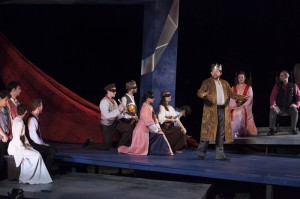
While “Something is rotten in the state of Denmark,” something is wonderful in the state of Delaware! With its unsurpassed examination of the human condition, profound emotions, and exquisitely beautiful language, HAMLET is considered by many (myself among them) to be the world’s greatest play by the world’s greatest playwright. So what better way to commemorate the 450th anniversary year of Shakespeare’s birth than with an open-air presentation of his most famous and most often performed work? And what better words to describe Delaware Shakespeare Festival’s enthralling production than those of Polonius (Act II, scene ii): “‘Fore God, my lord, well spoken . . .”?
Performing on a mostly bare-stage, director David Stradley’s fine cast (with text coaching by John Bellomo) follows Hamlet’s dictum to “suit the action to the word, the word to the action.” From James Kassees’ amusingly long-winded Polonius, to Caroline Crocker’s regal and sybaritic Gertrude, Carl Granieri’s unapologetically treacherous Claudius, and Clare Mahoney’s fragile and heart-wrenching Ophelia, the actors fully comprehend and inhabit their roles, expressing their characters’ inner lives and outward traits, and creating believable human beings to whom audiences can relate, and in whom they will recognize parts of themselves.
Griffin Stanton-Ameisen, who stars as the doomed Danish prince, gives the most gripping performance of his young career, as he ruminates on the meaning of life and death, reveals his disgust with his mother, abhorrence of his uncle, and contempt for his untrue friends, and displays an increasingly “antic disposition” in his quest for vengeance. His multi-dimensional Hamlet captures all the contradictions that make the protagonist so infinitely intriguing, shifting from contemplative to impetuous, grief-stricken to enraged, indecisively melancholic to intensely active. Under Stradley’s expert blocking, he commands scenic designer Oona Curley’s three-level stage (as does Mahoney, in Ophelia’s madness), accosting colleagues and kinsmen, recklessly leaping across the platforms, dashing over the steps, through the upstage arch, and off into the copse that surrounds them.
Also impressive are Michael Gamache, in his dual roles as the ghost and the gravedigger, Alex Stewart as the passionate Laertes (whom I would have liked to have heard deliver the tender “May violets spring” eulogy to Ophelia, which was cut from the script), and Johnny Smith and David Pica, providing some comic relief as the meddling Rosencrantz and Guildenstern. Kudos are due as well to Michael Hahn for his skillful sound design, which remained strong and clear in the challenging outdoor space, and to John and Samantha Bellomo for their exciting fight choreography. Though the play’s opening night-watch castle scene is here performed in daylight, thereby detracting a bit from the haunting nocturnal vision of the ghost, a magnificent full moon graced the third act on opening night, and bats darted over the stage during Claudius’s prayer (Act III, scene iii), fortuitously contributing to the evocative mood of the tragedy.
As always, DSF provides opportunity and training for upcoming theater artists. This year’s college apprentices (Joe Hetterly, Stephen Keebler, Lily Ozer, Pratigya Paudel, and Sean Vermeire) perform supporting roles in the production, serve as understudies for the lead actors, and offer a witty post-modern pre-show synopsis of the play (gates open 75 minutes before curtain time), and cellist Paul Gianakon plays original period-style music composed by Christiaan Clark (both talented seniors at the University of Delaware). [Rockwood Park, 4651 Washington Street Extension, Wilmington, DE] July 11-27, 2014, delshakes.org/.
